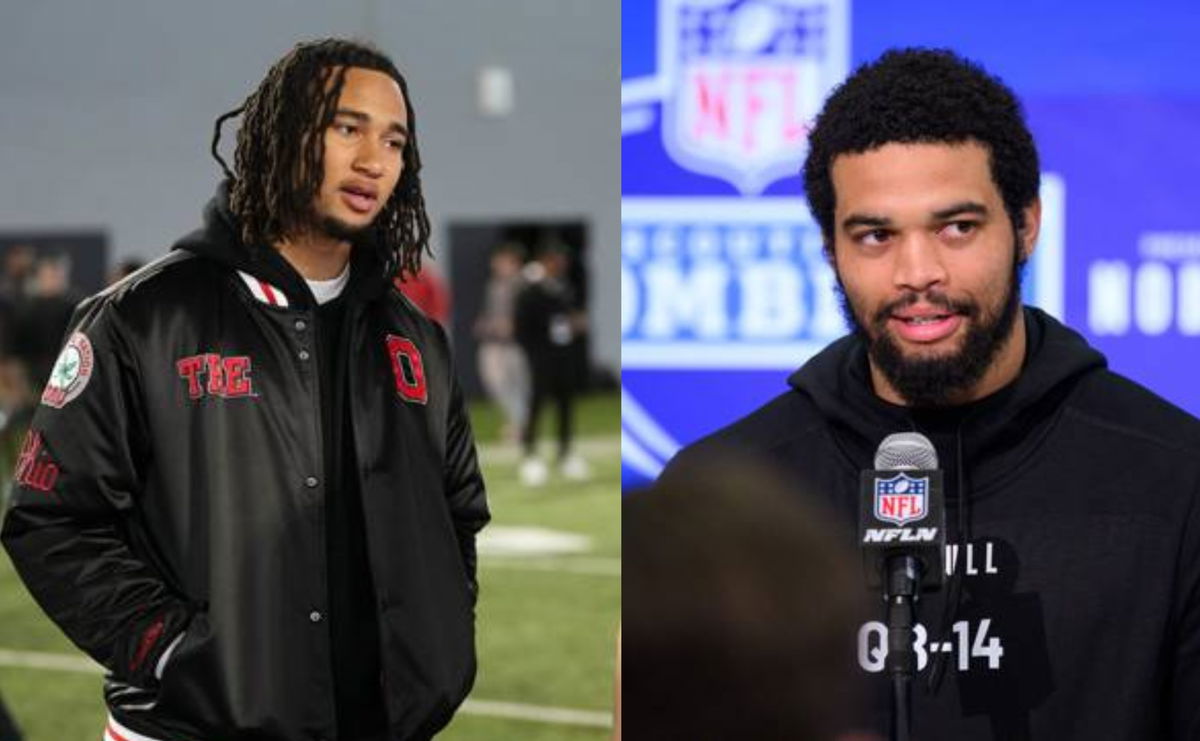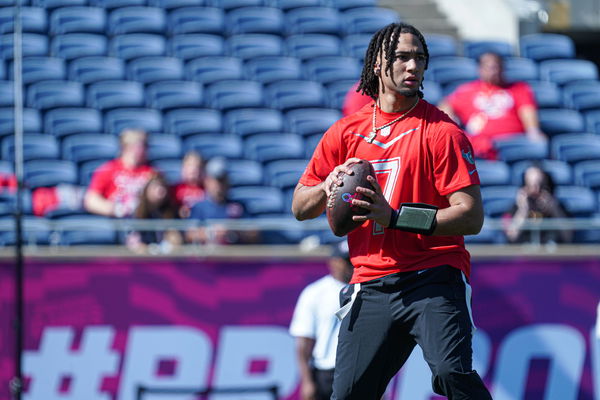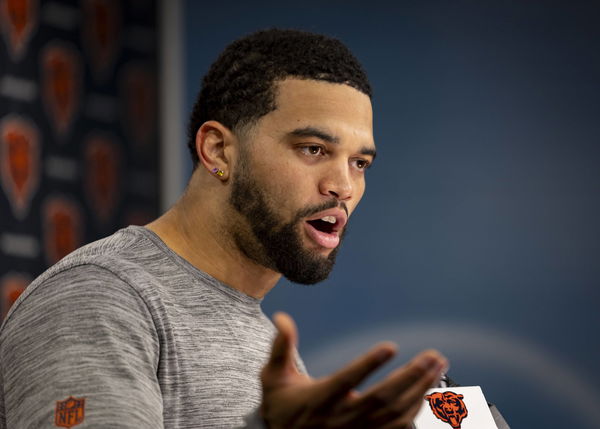
Imago
Credits: Imago

Imago
Credits: Imago

Imago
Credits: Imago

Imago
Credits: Imago
Remember Monday Night in ’85? That was when a brutal hit became the NFL’s reminder that defensive coordinators are master hunters and young quarterbacks are prized prey. Fast forward four decades, and the hunt has evolved. Indeed, now it’s less brute force, more calculated predation through film study and disguised pressures. “They know what you’re good at,” Texans QB CJ Stroud warns Bears sophomore Caleb Williams. “They try to just cut that off.” That’s the universal lesson for any franchise QB. In fact, the hits don’t stop. They only get smarter.
Watch What’s Trending Now!
On Franchise Faces: Hosted by Kay Adams, the sack stats landed like body blows: “You and Caleb got sacked more than any of the other quarterbacks in the league.” She isn’t wrong. Notably, Williams absorbed 68 sacks as a rookie—a Bears record and the third-most ever in a single season.
Stroud wasn’t far behind, eating dirt 52 times. Adams pressed Stroud, seeing Williams’s thoughtful nod: “Any advice that you would give to Caleb on handling that…on those defenses figuring you out?” Undoubtedly, Stroud leaned in, his tone a blend of big-brother concern and hard-won clarity.
Stroud’s answer? Indeed, it was a hoops metaphor sharp enough to cut through NFL complexity. “It’s like playing basketball. If you find out a guy can’t go left, they’re going to try to force you left.” Defensive coordinators, Stroud stressed, are relentless film junkies—studying every throw, every scramble, every tell. “Whatever your weaknesses are, whatever you’ve put on tape and film, that’s what defensive coordinators are watching every single day, and they’re just trying to find twists and schemes.” That’s a good thing to follow.

Imago
2024 NFL, American Football Herren, USA Pro Bowl Practice Session NFC & AFC, Orlando, Florida, USA Orlando, Florida, USA, February 2, 2024, CJ Stroud 7 of the Houston Texans During AFC vs NFC NFL Pro Bowl Practice Session at Camping World Stadium. NOxUSExINxGERMANY PUBLICATIONxINxALGxARGxAUTxBRNxBRAxCANxCHIxCHNxCOLxECUxEGYxGRExINDxIRIxIRQxISRxJORxKUWxLIBxLBAxMLTxMEXxMARxOMAxPERxQATxKSAxSUIxSYRxTUNxTURxUAExUKxVENxYEMxONLY Copyright: xMartyxJean-Louisx Editorial use only
Despite the Tape controversy of Williams, their goal? Simple sabotage. “The main thing they want you to—to extend plays every time.” It’s like facing a ‘Madden’ player who’s memorized your entire playbook and sets blitzes to exploit your controller’s sticky left thumb.
Stroud’s prescription is deceptively simple yet transformative: “Bro, just get it out your hand.” He paints a pocket survival guide—recognize the coverage shell (Cover 2, Cover 4), and if your primary read isn’t there, “get rid of the ball.” Live for the next down. “The less hits you take, the better…it’s 17, 18 long weeks…it gets long.” From that moment on, Williams carried an anti-hero ball philosophy and enunciated.
From hero ball to head smart: Stroud’s mic’d-up moment becomes Caleb’s turning point
His advice crystallizes into a mantra for longevity: “Get rid of the ball, check it down, um, and just be smart.” Indeed, it’s the anti-hero ball philosophy. A lesson Stroud himself reinforced when he pulled Williams aside after their Week 2 clash. He, in fact, was mic’d up, urging him: “Stop taking those hits. Learn from those mistakes…You’re going to be a hell of a player.” The stakes of that advice became clear by Season’s end.
In Week 17, Williams rolled left—his perceived ‘weak side’—double-pumped, and paid the price with a blindside sack-fumble. That forced left sack was a stark reminder of what happens without swift decisions. But rewind to Week 8 against Washington. That was where Williams faced a 51% pressure rate and opted for quicker, quieter choices—dirt balls and throwaways—and absorbed just three sacks. By diagnosing, deciding, and dispatching, he demonstrated the power of Stroud’s system.

Imago
May 28, 2025, Lake Forest, Il, USA: Chicago Bears quarterback Caleb Williams speaks after practice at Halas Hall on Wednesday, May 28, 2025, in Lake Forest, Illinois. Lake Forest USA – ZUMAm67_ 20250528_zaf_m67_014 Copyright: xBrianxCassellax Lake Forest USA – ZUMA0820 0820939254st Copyright: xIMAGO/BrianxCassellax
For Williams, Year 2 isn’t about abandoning his explosive talent. Indeed, it’s about weaving it with pocket pragmatism. As Stroud wisely put it: “Be yourself… You don’t have to be a superhero. Sometimes the boring plays are good.” Translation? Master the mundane, and the magical moments shine brighter.
Chicago’s rebuilt O-line and added weapons—DJ Moore, Rome Odunze—set the stage. Now it’s on Caleb. Despite being forced into the team, he needs to see the shell, feel the hunt, and let the ball fly before the pocket collapses. Because in this league, survival isn’t just skill—it’s strategy whispered from one sack survivor to the next, indeed.





